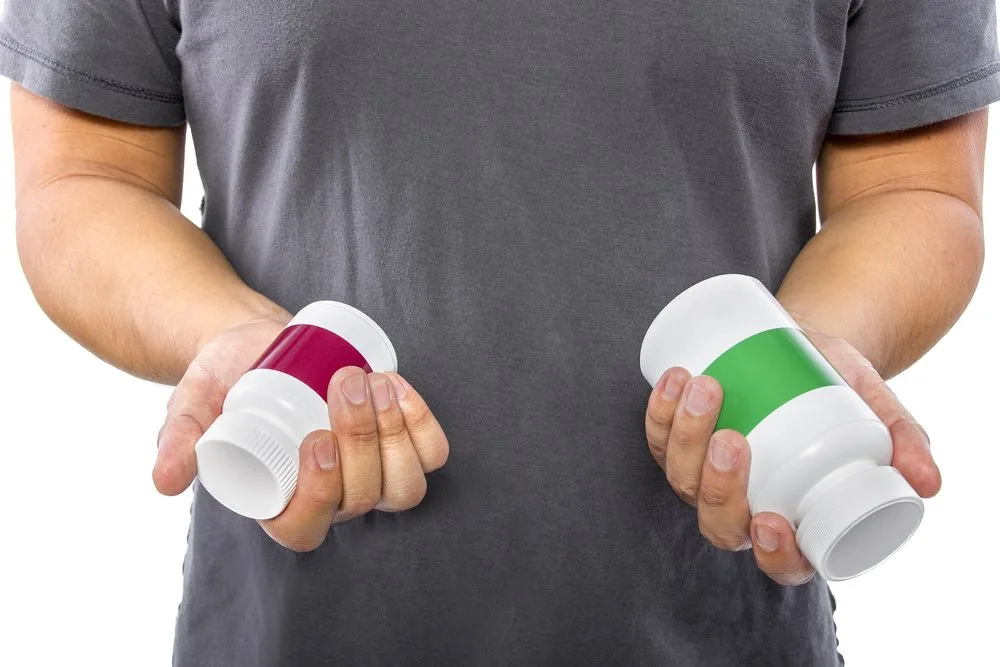It’s officially Movember and that means that the spotlight is not only on men and their mustaches but also on how well they take care of their health. We all know that probiotics are great for our health, but just how exactly can they help the men in our lives?
Benefits of Probiotics for Men’s Health
1. Improved heart health
According to the Centers for Disease Control and Prevention (CDC), heart disease is the leading cause of death for men in the United States (1). This is likely due to excessive alcohol consumption, an unhealthy diet, and heightened stress levels. 
Now, while nothing but lifestyle changes can reduce one’s risk for a heart attack, probiotics can help improve heart health.
The first way in which they do this is by helping to significantly lower cholesterol, especially in people already dealing with high cholesterol (2).
Additionally, a study published in Lipids in Health Disease found that probiotics can also help regulate blood pressure, creating a potential treatment for those dealing with hypertension.
2. Regulated blood sugar levels
With Type 2 diabetes affecting men more than women, it’s important for them to control their blood sugar levels, and it appears that probiotics can help them do this.
A 2020 study published in Scientific Reports revealed that the use of probiotics in the management of diabetes can help to not only improve HbA1c, fasting plasma glucose, and fasting insulin levels, but also reduce total cholesterol and triglyceride levels, which in turn reduces the risk of complications.
3. Supports healthy testosterone levels

Image Point Fr/Shutterstock
Similar to women, men also begin to experience a decline in hormonal levels after the age of 30. Low testosterone levels can lead to reduced sex drive, bone mass as well as erectile dysfunction. However, it appears that supplementing with probiotics may help to address the low testosterone.
In a 2017 study where infertile men underwent a probiotic/prebiotic therapy, the results found a significant improvement in testosterone levels. That said, it’s clear that more research still needs to be done to better determine the effect that probiotics can have on testosterone levels.
4. Manages mental health
While women are more affected by depression, men are more likely to die from suicide (3). We’re clearly in the midst of a mental health crisis, and it appears that probiotics may be one of the tools that can help us navigate and manage this crisis.
A meta-analysis published last year found that probiotics may help alleviate symptoms of depression in those who have been diagnosed with depression, as well as those diagnosed with depression scores in anxiety disorder diagnosis. Therefore, the researchers suggest that probiotics should be included more in the treatment of patients with depression in the future.
Bottom line
While probiotics are a great way for men to take care of themselves, as well as their gut health, they’re not the only key to improved health. Exercising, eating a healthy, balanced diet, drinking plenty of water as well as managing stress levels can improve your health and it can also do wonders for your gut.
Want to know more?
If there’s one person who knows how to take care of himself, then it’s definitely Super Bowl legend Tom Brady. At 43 years old, the NFL quarterback is officially the oldest NFL player to play in a Super Bowl. So, what are his health and fitness secrets?
References
Chao, L., Liu, C., Sutthawongwadee, S., et al. (2020). Effects of Probiotics on Depressive or Anxiety Variables in Healthy Participants Under Stress Conditions or With a Depressive or Anxiety Diagnosis: A Meta-Analysis of Randomized Controlled Trials. Frontiers in neurology, 11, 421. https://doi.org/10.3389/fneur.2020.00421
Kocsis, T., Molnár, B., Németh, D. et al. (2020). Probiotics have beneficial metabolic effects in patients with type 2 diabetes mellitus: a meta-analysis of randomized clinical trials. Sci Rep 10, 11787. https://doi.org/10.1038/s41598-020-68440-1
Qi, D., Nie, XL. & Zhang, JJ. (2020). The effect of probiotics supplementation on blood pressure: a systemic review and meta-analysis. Lipids Health Dis 19, 79. https://doi.org/10.1186/s12944-020-01259-x
Wang, L., Guo, M. J., Gao, Q., Yang, J. F., Yang, L., Pang, X. L., & Jiang, X. J. (2018). The effects of probiotics on total cholesterol: A meta-analysis of randomized controlled trials. Medicine, 97(5), e9679. https://doi.org/10.1097/MD.0000000000009679



![women [longevity live]](https://longevitylive.com/wp-content/uploads/2020/01/photo-of-women-walking-down-the-street-1116984-100x100.jpg)










